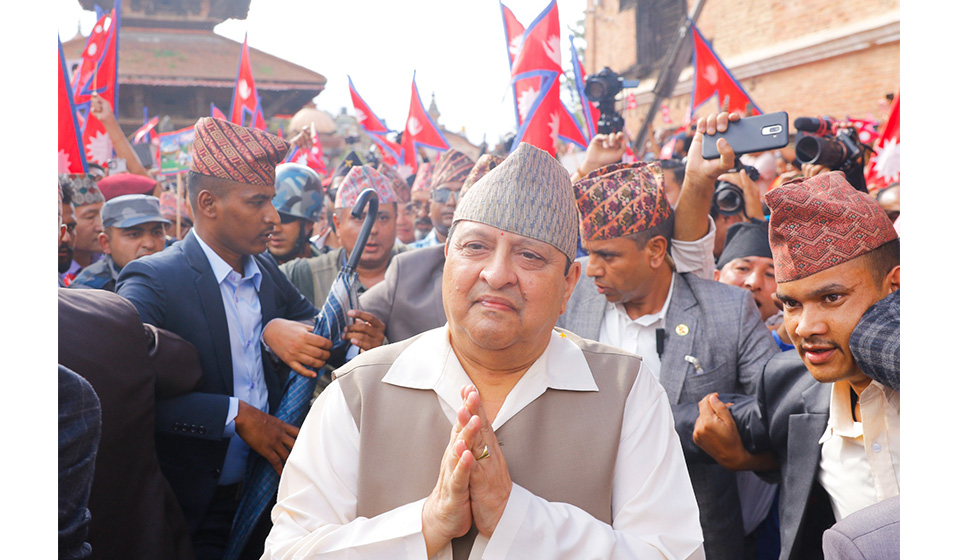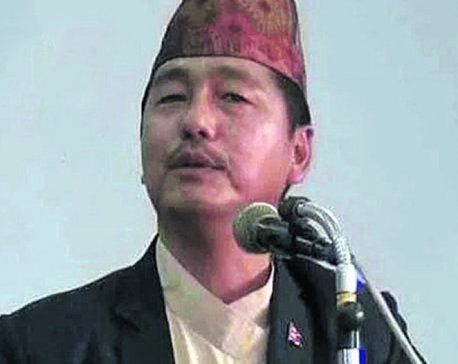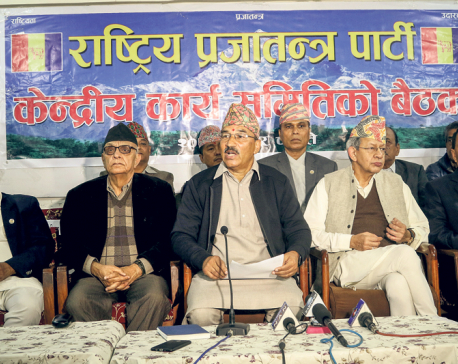
OR
Opinion

The country is basically in the hands of plutocrats
The royalists still believe that monarchy was unceremoniously abolished through street demonstrations and agitations, instigated by foreigners. For them even the Constitution is drafted by foreign hands.
The deafening noise of raja aau, desh bachau is heard in the streets in Kathmandu and some urban centers of Nepal. Some draped in triangular flags, wearing dhaka topis and others in orange saffron, one can easily figure out the crowd of rajabadies.
Bolstered by the popularity of BJP in India and electoral success gained by some independent candidates and political outfits, including RPP in last local and federal elections, the rajabadies are in a boisterous mood, looking for a comeback – possibly a hat-trick monarch. This is no wonder in a country where political leaders become prime minister for an umpteenth time. However, they should remember that Gyanendra Shah’s two time accessions to the throne was due to sheer incidental or coincidental factors. In probability terms, a single person becoming the king for the third time is very slim.
The mutual backstabbing, mudslinging, intra-party quibbling and lackluster performance of coalition governments post-FDR Nepal has helped to fuel the fire of the rajabadies. They are even issuing threats and ultimatums to vacate Narayanhiti Palace – the ex-king’s residence now turned into a public museum. Others are challenging for a referendum.
Over the last twenty years or so, the electoral demography of the voters have changed. These young voters don’t even carry the memory of palace massacre, forget about royal misrule and excesses. Instead they romanticize with the past. Basically, rajabadies are cashing in on this situation.
While mainstream parties absurdly keep busy with “Mission 84”, that is, next election scheduled four years down the lane, pro-royalists are determined to topple the government and turn the clock backward.
The royalists still believe that monarchy was unceremoniously abolished through street demonstrations and agitations, instigated by foreigners. For them even the Constitution is drafted by foreign hands.
The very first illogical logic rajabadis are harping on comes from a jungle rule akin to big fish eating smaller fish: It is better to be ruled by a single lion than to be ruled by hundreds of jackals. There are other variants to this logic: It is better to have one king than to have thousands of chhotaa rajas; it is economical to feed one king than to afford thousands.
Definitely, in a FDR Nepal we have seen excesses and nepotism of the politicians to a level of absurdity. You agree or not, the country is basically in the hands of plutocrats. However, autocracy can never be an answer to the ills of democracy. An alternative to democracy is more democracy. In the same manner, an alternative to republic is more republic. But the rajabadies have a clear preference for the laws of the jungle.
A rule by a single lion is preferable to a rule by hundreds of jackals is like saying organized corruption/crime is better than disorganized corruption/crime. However, the fact is that corruption/crime, whether organized or disorganized, is definitely harmful.
In a jungle raaj, the lion happens to be a king simply because it is at the top of the food chain. The rule of hierarchy, stronger vs. weaker, smaller vs. bigger applies only in the world of animals, not in the case of humans.
The second argument they posit is that federalism is too costly for a small country like Nepal; secularism even when defined in a diluted form, is against the tradition of Hinduism; inclusive character of the system has eroded the power of the few that has ruled the roost for generations; and republicanism has helped to breed lots of smaller kings, with smaller fiefdoms.
One thing rajabadies speak the truth is that monarchy sans Hinduism is impossible to implement. However, they fail to acknowledge that monarchy is not possible in a federal and inclusive system. Nepal’s disrepute of by-gone monarchy was based on a unitary Hindu state with an exclusionary character, primarily, dominated by bahun-chhetris from middle hills. To reinstate monarchy, they have to dismantle federalism, inclusiveness and secularism. Forget about rajabadies, even Gyanendra Shah will think twice to manage the political mess.
When internal logics are exhausted, they rely on external logics. One idea that is being floated is that almost all countries with monarchical systems, in the present day world, are advanced countries. They cite Japan, the UK, Norway, Finland, Sweden as an example or even the Gulf countries like Saudi Arabia, the UAE, Qatar, Kuwait where a swath of Maoist fighters, who rebelled against the monarchy, are currently working. However, what they fail to understand is the quality of monarchy in these countries vis-à-vis Nepal’s egregious one.
Highly frustrated rajabadies may muddy the political waters but definitely they are not going to catch fishes. One of their stalwarts or rather a political grasshopper, Durga Prasain is striking the communal cords of Newar community in the Kathmandu Valley against Marwari community is simply not going to work.
Probably, the best joke on monarchy comes from the equally eccentric Mayor of Dharan, Harka Sampang, when he declared on social media that he is the best person qualified to become the king of Nepal. His reasoning goes: he is young, can sing songs, wears dark shades and can wave hands doing nothing!
You May Like This

The Process of Political Polarization in Nepal
Nepal’s internal politics is all about triangular fights transforming into bi-polar fights leading to a win-lose situation. When there are... Read More...

I will make RPP strong within six months: Chairman Lingden
KATHMANDU, Dec 19: Rastriya Prajatantra Party (RPP) Chairman Rajendra Lingden has claimed that the party will be strengthened within the... Read More...

RPP puts on hold monarchy restoration demand
KATHMANDU, Nov 25: Less than a week after its unification with the Rastriya Prajatantra Party-Nepal (RPP-N), the unified Rastriya Prajatantra Party... Read More...







Just In
- NRB to provide collateral-free loans to foreign employment seekers
- NEB to publish Grade 12 results next week
- Body handover begins; Relatives remain dissatisfied with insurance, compensation amount
- NC defers its plan to join Koshi govt
- NRB to review microfinance loan interest rate
- 134 dead in floods and landslides since onset of monsoon this year
- Mahakali Irrigation Project sees only 22 percent physical progress in 18 years
- Singapore now holds world's most powerful passport; Nepal stays at 98th












Leave A Comment